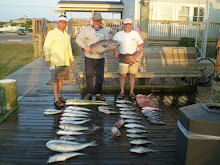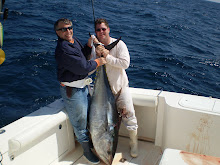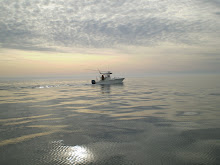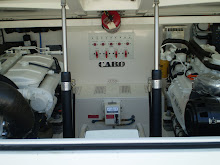
By Jim Field
There was an interesting story in the Wall Street Journal this past Monday, July 12, about the supposed practice of major restaurant chains--specifically, McDonald's Corp, Long John Silver's parent Yum Brands, and Red Lobster parent Darden Restaurants--to only buy fish from sustainable fisheries. To the extent this is true, I applaud the firms and their progressive supply chain practices. That said, I fully agree with the Greenpeace representative quoted in the story, who retorted: "The state of global fisheries is such..." that big chains "...don't have a sustainable source. They've just found a less bad source." In other words, things have already tanked, and keeping the world's population supplied with McFish Sandwiches is only going to make things worse over time. What I found especially interesting about the article was the companies' secrecy over which exact fish species they use for their sandwiches, and their contracting and purchasing practices. Implications: first, as a consumer, if the fish is white, you'll be eating it, regardless of its pedigree; and second, they will buy whatever they can get their hands on, and only worry about sustainability to the extent that it doesn't impact revenues. If they were serious about fishery sustainability, how about considering the idea of removing fish from their menus for perhaps a decade so as to let stocks recover. Would anyone miss this food item? Short answer: no. Just go for the chicken fillet instead.
Note: A big cheer for the Capital Grille chain--also owned by Darden--which pulled Chilean Sea Bass from its menu a few years ago because it couldn't find a reputable supplier. Now that is stepping up to the plate and doing the right thing.

Restaurants Mobilize to Save Fisheries
As Global Consumption Soars, Big Buyers Join Growing Effort Toward Eco-Friendly Practices Meant to Sustain Species
By PAUL ZIOBRO
The world's rising appetite for seafood is on a collision course with its wild fisheries, leaving restaurant companies and other big buyers caught in the middle.
Amid reports the world's oceans are in danger of being emptied of some fish, companies such as McDonald's Corp., Long John Silver's owner Yum Brands Inc. and Red Lobster parent Darden Restaurants Inc. have embraced the growing movement toward more eco-friendly seafood-buying practices.
Enforcement of federal fisheries conservation laws has helped the haddock, above, recover from declines.
They are working with scientists and nonprofit groups to ensure the fish they buy is sustainable, meaning caught in a way that doesn't damage the ability of the species to reproduce.
"We know if we go raping and pillaging it today, there's nothing left for tomorrow," says Ken Conrad, the owner of the chain of 10 Libby Hill seafood restaurants in North Carolina and Virginia and chairman of the National Fisheries Institute, a seafood-industry trade group.
Some experts say their efforts are coming none too soon.
A recent United Nations study predicts that unless something changes, nearly all commercial fisheries will be producing less than 10% of their onetime potential by the middle of this century. Already, almost 30% of the world's fish stocks fall into that category.
Production by wild fisheries has remained fairly steady over the past decade, totaling about 90 million metric tons per year, says the U.N.'s Food and Agriculture Organization. But annual seafood demand will rise to at least 150 million metric tons by 2030, it adds.
While some fishing-industry groups agree that they need to change the industry's standards, they think smarter fishing can keep fisheries from becoming depleted.
"We know where weaknesses are and a tremendous amount is being done to address those challenges," says Gavin Gibbons, spokesman for the National Fisheries Institute, a seafood industry trade group. "The idea that vast fisheries broadly are headed to wholesale collapse contains a healthy dose of hyperbole and doesn't recognize much of the work being done."
Population growth and the public's growing appetite for seafood are only part of the problem. Mismanagement of fisheries and illegal fishing also have hurt some wild fisheries.
One glaring need for reform came from North Atlantic cod, the only fish McDonald's used in its Filet-o-Fish sandwich until the late 1980s. Newfoundland cod-fishing grounds became so overfished that the fishery shut down in the early 1990s. Fish suppliers and harvesters "destroyed the whole fishing area," says Gary Johnson, senior director of McDonald's global supply chain. McDonald's now uses five different whitefish species in the sandwich.
McDonald's, which buys 50,000 metric tons of whitefish a year, now judges fisheries on three factors: how closely they are monitored to ensure that, for example, fishing boats don't cheat on their quotas; whether enough fish are left to allow the stock to rebound each season; and the toll taken on the environment from the fishing methods being used. McDonald's says the vast majority of its fish now comes from sources that meet sustainability guidelines, such as those given by the Marine Stewardship Council.
In 2007, McDonald's stopped using Eastern Baltic cod because it was skeptical that the number of fish being caught was being recorded correctly. This year, after suppliers improved their reporting standards, McDonald's once again began buying Eastern Baltic cod, underscoring how large buyers can force change in practices.
McDonald's wouldn't disclose how much the tighter monitoring and pickier buying has added to its costs.
Not all of the large chains can expect their buying habits to trigger change, though. Red Lobster parent Darden, which buys 100 million pounds of seafood annually, decided shortly after it bought the Capital Grille chain in 2007 to take Chilean sea bass off the chain's menu because it couldn't find a supplier that used suitably sustainable fishing methods.
"We swallowed hard about taking it off [the menu], but we're such a small player that we would not be able to have an influence," says Bill Herzig, senior vice president of purchasing and supply-chain innovation. The company has only been able to persuade a few suppliers, including one Thai shrimp farm, to adopt sustainable practices.
Some species, such as haddock and Atlantic sea scallops have recovered from previous declines, after the U.S. government began enforcing parts of federal fisheries conservation legislation in the 1990s, says Ray Hilborn, a professor of aquatic and fishery sciences at the University of Washington.
As wild fisheries are unlikely to be able to meet the world's growing seafood demands, aquaculture—or raising seafood in enclosed, controlled environments—is one way to make up the shortfall.
But aquaculture has its own set of challenges. Farm-raised fish need more pesticides and antibiotics in captivity, and some fish, like salmon, have to be fed dye additives to give their flesh the orange hue consumers expect. Meanwhile farm-raised fish can have an indirect effect on their wild cousins because they consume feed that comes from the sea, which depletes the wild supply.
Darden works with the nonprofit Global Aquaculture Alliance on global standards for sustainable aquaculture. Darden also is pioneering new practices, including incorporating more grains into the diets of captive fish to reduce their reliance on seafood-based feed.
Greenpeace says that while restaurants and other large seafood buyers have become more mindful of the environmental impacts of their purchases, some are still looking too narrowly at sustainability.
For instance, large-scale harvesting of the Alaskan pollock, one of the fish McDonald's uses, affects the food supply of Steller sea lions and fur seals, says John Hocevar, Greenpeace's ocean-campaigns director. He encourages the large chains to invest in new methods of aquaculture that don't upset the environment.
McDonald's says it buys only Alaskan pollock that comes from sources certified by third parties as sustainable.
"The state of global fisheries is such," Mr. Hocevar says, that the big chains "don't have a sustainable source. They've just found a less bad source."









No comments:
Post a Comment